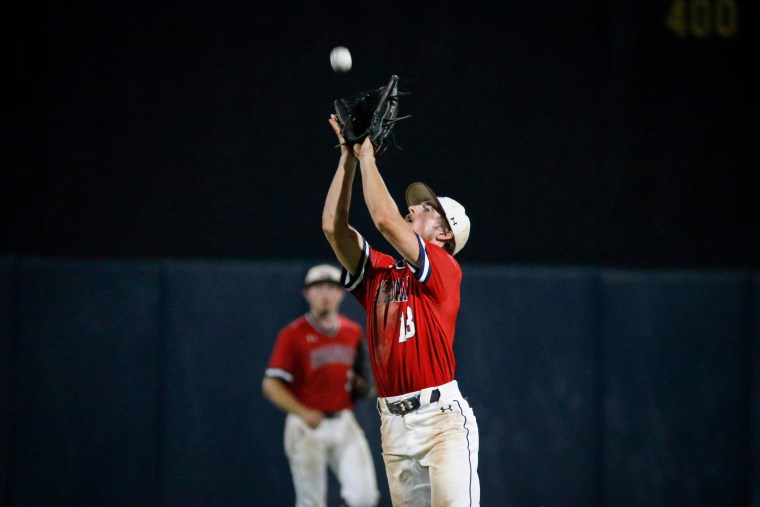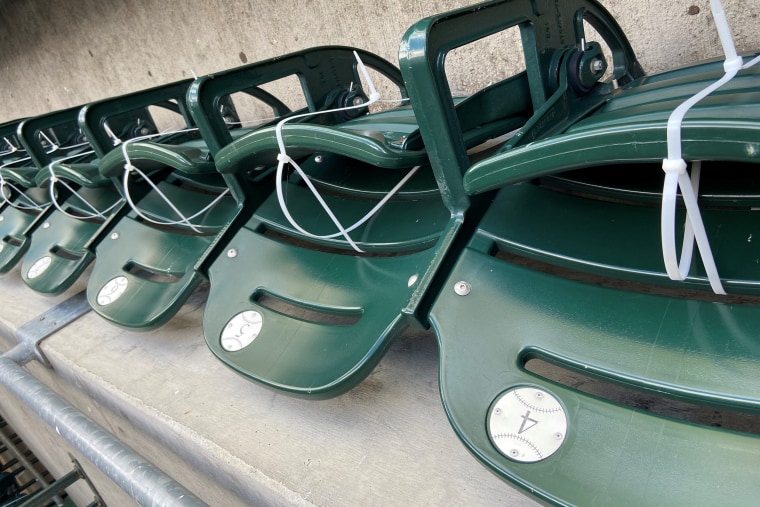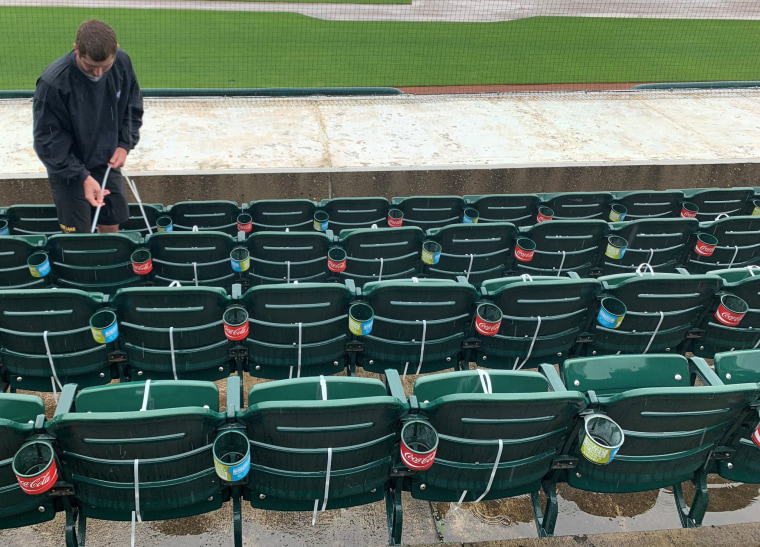Thousands of Iowa teenagers are set to take on the role of reviving America's pastime — after athletes across the country have been benched by the ongoing coronavirus pandemic.
On Monday, season-opening high school baseball and softball games are scheduled across the state, to the excitement of Iowa high school sports officials and the worry of some health experts.
About 250 of 331 high school baseball teams and at least 262 of 334 softball squads are set for action that day. With no rain in the forecast, that means an overwhelming majority of Iowa's 6,000 high school baseball players and 6,000 high school softball players will don uniforms and spikes.
For years, Iowa has been the only state to play high school sports in the summer.
"We're excited to give the kids a chance to get back out and do the things they love," said Tom Keating, executive director of the Iowa High School Athletic Association, which oversees the boys sports, including baseball.
But Dr. Michihiko Goto, an assistant professor of infectious diseases at the University of Iowa's Carver College of Medicine, said the restart makes him nervous: "The timing is not right."
After all, the hundreds of high school games are set to be played five days after an announcement that the iconic Iowa State Fair, held nearly every year since before the Civil War, was scrapped for 2020.
Fair organizers said large gatherings wouldn't be safe "given the current COVID-19 situation."
First competitive, sanctioned team sports since games shut down
Iowa's high school games could mark the first competitive, sanctioned team sports in the U.S. since the coronavirus pandemic brought an abrupt end to athletic action three months ago.
All high school, junior college and college sports stopped in the second week of March due to the pandemic. The final pre-pandemic NHL and NBA games were contested on March 11, and Major League Soccer suspended its season on March 12.
The National Women’s Soccer League along with Major League Baseball and its minor league affiliates never got their 2020 regular seasons underway.
A handful of loosely organized baseball leagues, for college players and using wood rather than the usual aluminum bats, started play earlier this month. But those contests are staged more for development and showcasing of individual players to pro scouts than for winning ballgames.
Some American Legion baseball leagues have started play, but without the backing of the national organization.
Iowa Gov. Kim Reynolds announced May 20 that high school sports practices could return on June 1 and games two weeks later.
The state's prep softball players are focused on "going to post-season, to win a championship," said Jean Berger, executive director of the Iowa Girls High School Athletic Union, which oversees girls prep sports, including softball.

High school baseball and softball games had originally been slated to start on May 25 in Iowa.
"We feel this is a great opportunity to get them connected to their schools that they've been away from since March," Keating said. "While they might not miss their five-page research papers, I'm sure they miss their classmates, their teachers and the interaction they have day to day. This gives them a little taste of that again."
Typically, prep baseball and softball seasons across America start in mid-March and end before commencement — with plenty of bad weather wiping out games early in the campaign.
But since 1946 in baseball and 1957 in softball, Iowa high schoolers have played these sports starting in late spring with games going deep into July. The unconventional schedule means fewer games canceled by bad weather and 12th-grade players competing for their schools despite having graduated.
So even during the darker days of the pandemic in March and April, plans to have 2020 prep baseball and softball seasons in Iowa were never taken off the table.
Iowa ranks 19th in per capita COVID-19 deaths
The Iowa teens will take the diamond on Monday as their state continues to struggle with the coronavirus.
- As of Saturday morning, Iowa had a little over 20 coronavirus deaths per 100,000 people, the 19th highest rate among states, according to data collected by Johns Hopkins University.
- Iowa also has the 11th highest infection rate of any state, with about 728 confirmed cases per 100,000 residents, according to the Johns Hopkins data.
- The state is also among those that so far have failed to meet the World Health Organization's recommended test-positivity rate of 5 percent or lower. Iowa's rate was 6.45 percent as of Saturday.
Goto, at the University of Iowa, said he's a big sports fan and is eager to see games again, just not yet in his state. He suggested other states with lower rates of infection or death would be better settings.
"Iowa is not in the position to take the lead of the nation, and we're going first," he said. "It makes sense for Montana or Idaho to go first, but why are we taking the lead on this issue? That makes me very nervous."
The state's girls sports chief, Berger, said she fully understands the risks of restarting play.
"I'm certainly not naive enough to think we are not going to have a softball player who tests positive or that we won't have challenges related to the virus on the team," Berger said. "I know that that's coming."
No more handshakes or shared water
Iowa athletic officials insist they're doing everything to make the games as safe as possible for athletes and fans.
Teams will not shake hands after a game, and players are being told not to pick up and hand a rival a dropped piece of equipment, such as a bat or catcher's mask.
Each player "must bring their own water/beverage to consume during and after games" because no "shared drinking fountains, water stations, or coolers may be used," according to guidelines.
The spitting of sunflower seeds, practically a separate food group for baseball and softball players, is out.
If a pitcher blows on his or her hand, a common act in every game, then that paw must be immediately sanitized.
Players will need to spread out in dugouts and even take positions down the line, into foul territory and away from benches.
And, on the spectator side, schools are being asked to rope off sections of the bleachers and make other arrangements for social distancing.

A 'first step'
Among the first baseball games to be played Monday will be in Des Moines, at Principal Park, home of the Triple-A Iowa Cubs.
Crews at Principal Park used zip ties this week to disable most of the stadium's 11,500 seats, leaving only 1,933 that can be used.
So fans will be forced to social distance if they want to watch Monday afternoon's game between the Tri-County Trojans and Colfax-Mingo Tigerhawks, or the doubleheader that night between the Ankeny Centennial Jaguars and Roosevelt Roughriders.
"We still know COVID is a serious risk and we want to do everything we can to mitigate that," Keating said. "We think this is kind of that first step to school activities, when we only have baseball and softball going, versus in the fall where we're going to have seven sports going. This is a good opportunity for us. We think we have an opportunity to give this a try and then learn from things from it."
Iowa's regulations do leave out requirements now being discussed for the openings of other sports and large gatherings.
There is no mandate for players and coaches to be tested, like in NHL and NBA restart plans.
Players, coaches and fans are being asked to take their temperature before going to the park, but that's being self-administered and not in the hands of health officials.
Fans are not mandated to wear face coverings under state guidelines, though individual schools and districts can make their own requirements.
Berger said she believes Iowa student-athletes have been responsible during the pandemic and deserve a chance to play.
"These kids are in a community, they've been careful, they've been with their families, they haven't been to the Lake of the Ozarks," Berger said, in a not-so-subtle shot at a notorious pool party that gained national attention and alarmed public health officials. "I think they've been isolating."
Goto said that while regulations are rightly "focused and obsessed with the games and practices," he's much more concerned with "what's happening after the game," when home teams dress in crowded locker rooms or visitors ride in cramped school buses — and then get together with their older loved ones after the final out is recorded.
The doctor equated teams' dressing and traveling to nursing home workers' casually socializing in their employee break rooms early this year, without knowing they were spreading a deadly disease.
But, even with the pandemic remaining a threat, Berger said she believes it's OK to play ball in Iowa.
"The virus is here; it's in our communities, and we're going to have to live with it for a long time, to manage it," Berger said.

